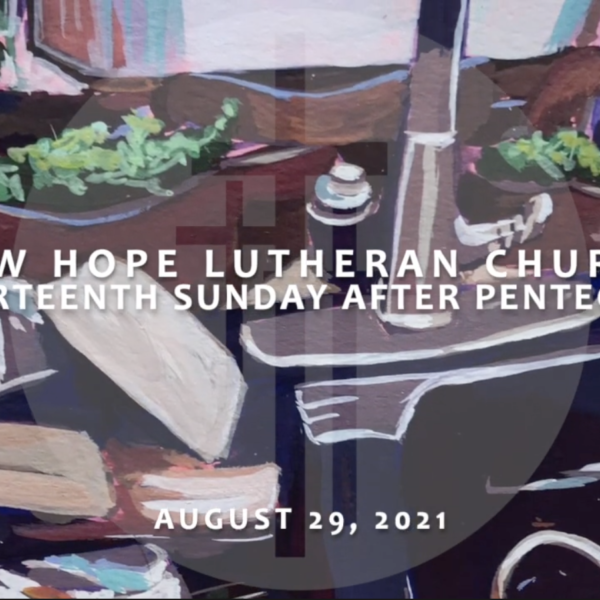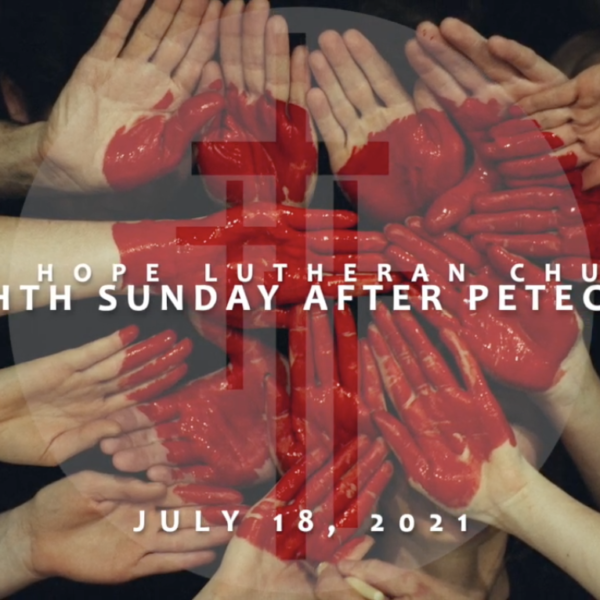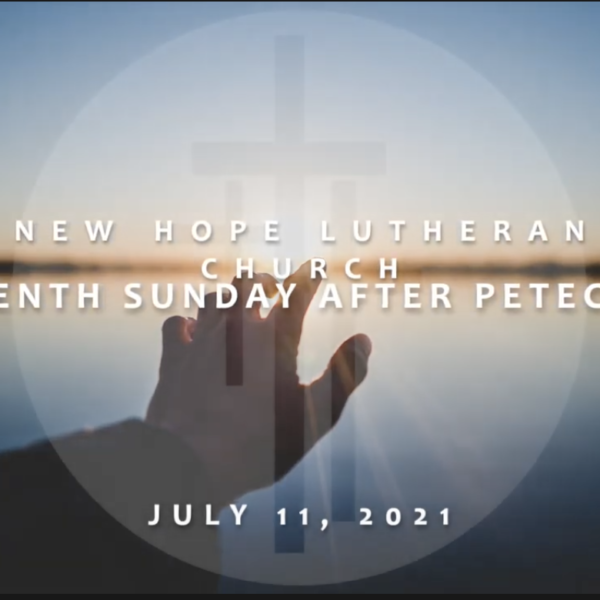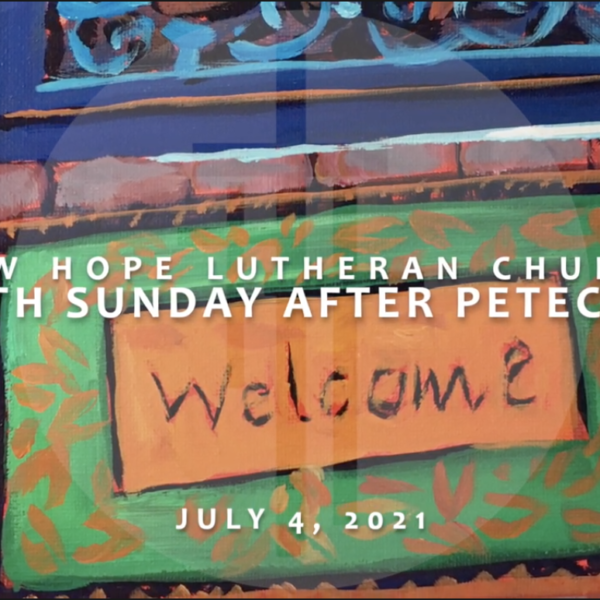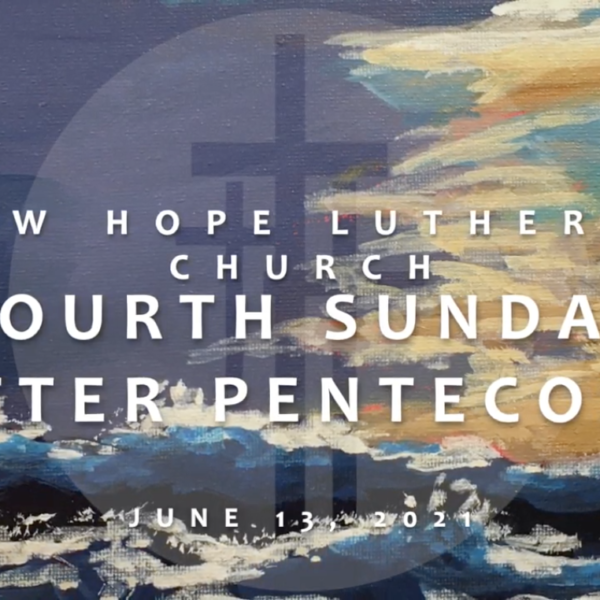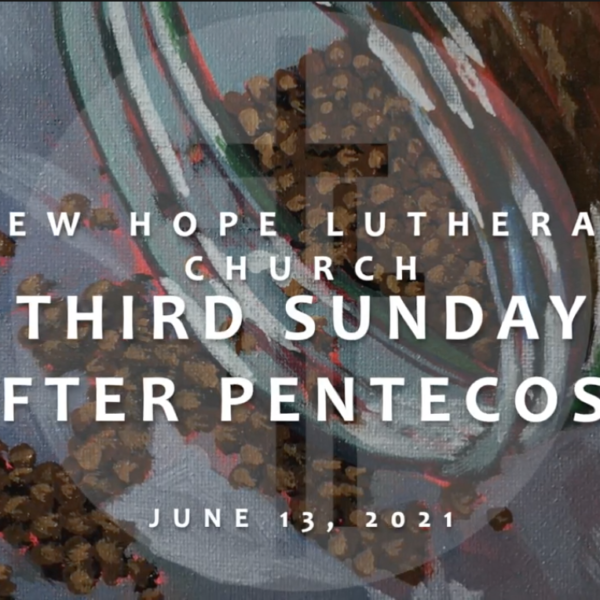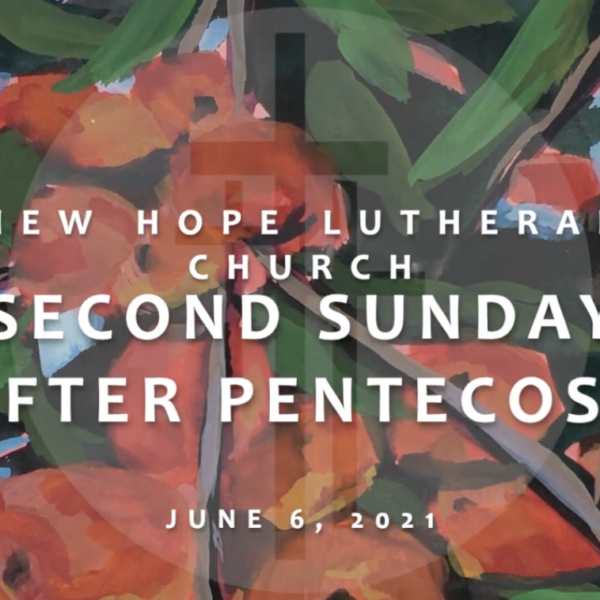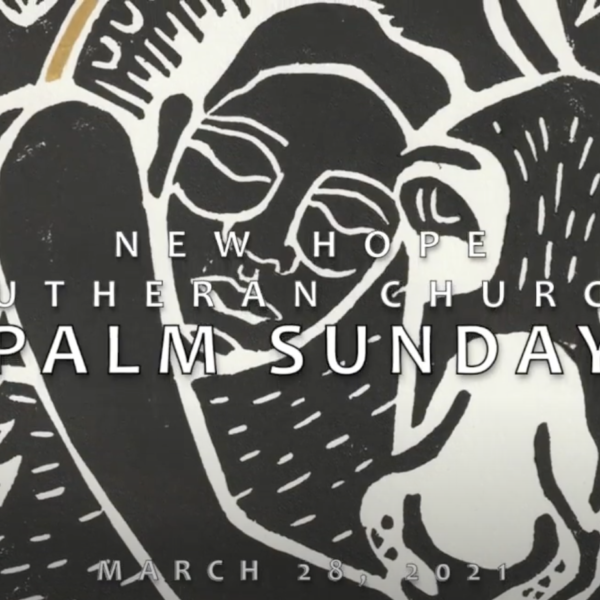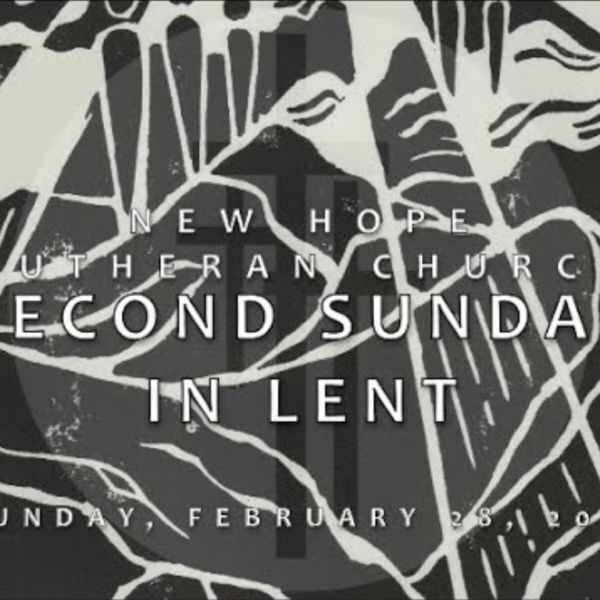Fourteenth Sunday After Pentecost 2021
Mark 7:1-8, 14-15, 21-23
1 Now when the Pharisees and some of the scribes who had come from Jerusalem gathered around Jesus, 2they noticed that some of his disciples were eating with defiled hands, that is, without washing them. 3 (For the Pharisees, and all the Jewish people, do not eat unless they thoroughly wash their hands, thus observing the tradition of the elders; 4 and they do not eat anything from the market unless they wash it; and there are also many other traditions that they observe, the washing of cups, pots, and bronze kettles.) 5 So the Pharisees and the scribes asked Jesus, “Why do your disciples not live according to the tradition of the elders, but eat with defiled hands?” 6 Jesus said to them, “Isaiah prophesied rightly about you hypocrites, as it is written,
‘This people honors me with their lips,
but their hearts are far from me;
7 in vain do they worship me,
teaching human precepts as doctrines.’
8 You abandon the commandment of God and hold to human tradition.”
14 Then Jesus called the crowd again and said to them, “Listen to me, all of you, and understand: 15 there is nothing outside a person that by going in can defile, but the things that come out are what defile.”
21 For it is from within, from the human heart, that evil intentions come: fornication, theft, murder, 22 adultery, avarice, wickedness, deceit, licentiousness, envy, slander, pride, folly. 23 All these evil things come from within, and they defile a person.”
—————
Please pray with me this morning, church:
God of life,
Our emotions seem closer and more accessible to us
Maybe than ever before.
Especially our emotions of frustration, anger, and disunity.
Remind us this morning that our words do matter.
Speak words of life to us today.
And help us speak those words of love and life into our world.
Amen.
—————
I’ve been engaged in a battle of wills with my toddler for about 10 months now. At first, when he started talking, the sounds were cute and everything you’d expect. Dada… Mama… All the usuals. But then, I think around late fall last year, he learned a new word. Despite all my best efforts to teach positive constructions and helpful affirmations, “yes” just wouldn’t take, but “no” sure did.
And the “no” word is pervasive.
What do you want for lunch? Do you want this? No. What about this? No.
Well, what about toys? Do you want to play blocks? No. Read books? No.
Eventually, we learned yes, and eventually, I learned to stop giving him so many choices.
Words are funny that way.
And I think we learn very early on about the power of words. See if you recall…
“I’m rubber, and you’re glue; whatever you say……bounces off of me and sticks to you.”
“Sticks and stones may break my bones, but……words will never hurt me.”
What a crock…
I suppose that kind of self-assured confidence is helpful for us when we’re in elementary school, but as we get older, I suspect we start to see the massive cracks in the logic of these aphorisms.
Because the truth is, church, words do have an impact. Words can and do hurt.
Your words have the power to wound and tear down and the power to build up, and so often these days, we seem to be exceptionally adept at the one, and woefully deficient at the other.
We’ve left the repetitive themes of feeding and nourishing in our Bread of Life series that we were in for the past 6 weeks or so, and launched back into the teachings of Jesus from the gospel of Mark, and are hearing them paired with readings from the book of James. We’ve left behind all the talk of unity and building up and being reconciled to one another from Ephesians, and we’ll hear a lot more pointed words from James, but I think the underlying message is constant throughout here: God’s interested in how you’re using your faith—to build up one another, to build up and strengthen the body of Christ, to serve and love others.
There was a video I saw recently of a young mother teaching her daughter about the importance of words. She had a plate and a tube of toothpaste. “What’s something mean you’ve heard your friends say before?” the mother asks her daughter. “That their clothes are dirty,” the daughter replies. The mother squirts out toothpaste onto the plate. “What else?” she asks. “That their hair’s messed up.” Another squirt of toothpaste onto the plate. “What else? Keep ‘em coming.” “Their shoes are raggedy. They’ve got no friends. Their house is a mess. Their toys are broken. They’re ugly. Their backpack’s worn out.” All more squirts of toothpaste out onto the plate.
“Ok,” the mom says, handing her daughter the plate and the squeezed tube of toothpaste, “Put the toothpaste back in the tube.”
The daughter looks at the plate, at the toothpaste, and at the tube, back at the plate a couple of times. “I can’t, Mama,” the daughter tells her, “I can’t get this toothpaste back in there.”
“And you can’t take those words back either,” her mother says. “Once they’re out of your mouth, they’re gone. You can’t take those things back. So if they’re hurtful, the damage is already done. So be careful what you say to people. Now give me a hug.”
A powerful message. About being cautious about what we say.
The author of James says it this way, “Be quick to listen. And slow to speak. Slow to anger.”
Jesus says, “There is nothing outside a person that by going in can defile, but it is what comes out of a person that defiles.”
Guard your words.
Quick to listen. Slow to speak.
Both the author of James and Jesus are couching this teaching in terms of faithfulness. Jesus is countering the arguments of the religious leaders that the disciples eat with unwashed hands. The religious leaders were putting up barriers between people and God, barriers between people and the practicing of their faith. The religious leaders were more interested in the purity and the adherence to these human-constructed statutes and ordinances, rules that were crafted by humans, not commanded by God, and using them to separate people from the practice of their faith, using them to separate people from God.
And the author of James here is warning against a practice of faith that may say all the right things on Sunday morning, but turns around the other 6½ days of the week and speaks with anger and vitriol and sordidness and wickedness—saying one thing on Sunday morning and something quite the opposite the rest of the week.
Know anyone like that? Know anyone that you look at their behavior and what they say and think, “There’s no way that’s the same person I sit next to in the pew next to on Sunday mornings.”
I’ll go first. I do. I know someone like that.
And spoiler alert: it’s me.
Some weeks are better than others, but I’ll be the first to confess to you, my siblings in Christ, that the number of times my words and actions throughout the week match up with what I hear from Jesus and preach about on Sunday mornings are far fewer than I’d like to admit.
Words of anger. Discontent. Thinking the worst of people. Speaking ill of folks, often in hushed words where they can’t hear. Being far less gracious toward others than I myself am in need of.
This is why we need God’s grace, of course. Because my how we’ve fallen short.
Every week we fail to live up to the Gospel ideals we hear from Jesus on Sunday mornings. Every week it’s like we forget how to be the people God calls us to be. And so every week we need reminding that the death and resurrection of Christ is God’s final word of love and life spoken into our world that continually seeks further division, further oppression, further anger, and further death.
Thank God that God always speaks words of healing.
“Your anger does not produce God’s righteousness,” the author of James writes.
I love that line. It’s an incredibly helpful reminder.
Because there are a great many things that we can be angry about, right?
Whether related to the pandemic that seems to never end or back to school stressors or that jerk that cut you off on the freeway…anger’s an easy emotion for us to tap into.
But your anger does not produce God’s righteousness, dear child.
Anger is ok, even holy sometimes, but anger is not to be weaponized. Be cautious of how your anger manifests. Be aware of the anger that seeks to escape from your lips.
What if, instead, we channeled our anger and frustration in a different way?
Jesus and the author of James are critiquing inauthentic religion. Jesus critiquing a ritual and purity system that constructs barriers between people and God, and the author of James critiquing a spirituality where the words and the actions don’t match up…a spirituality that speaks harsh and angry words instead of embodying care and concern for “the orphans and widows.”
“If any think they are religious, and do not bridle their tongues but deceive their hearts, their religion is worthless. Religion that is pure and undefiled before God, the Father, is this: to care for orphans and widows in their distress, and to keep oneself unstained by the world.”
Pure and undefiled and true religion is one that is focused outside of oneself, focused on the orphans and widows, those to whom God’s people are historically commanded to show deference. Throughout the Bible, God’s people are commanded to show particular care and concern to orphans, widows, and strangers.“Orphans and widows” that the author uses here are code words, as they are throughout the Bible, for the oppressed, marginalized, and vulnerable communities regardless of which century we’re talking about. Whether it’s 1st century Palestine or 21st century Houston, TX—our mandate, our commandment is to live and act with particular care and concern for vulnerable populations.
Whether we’re talking about how we live together in a global pandemic, what rules and restrictions should be in place in order to keep the most vulnerable safe…or we’re talking about housing justice, or economic justice, or racial justice, food justice, LGBTQIA2+ justice…your commandment is to live and act with deference, with particular care and concern for oppressed, marginalized, and vulnerable groups.
This is authentic religion.
This is worship, a belief system, a spirituality, a religion that is commanded by God and that is pleasing to God.
What if instead of anger and hostility, what if we were vocal, actually vocal and outspoken, about the matters of faith Jesus and the author of James lift up?
What if we were loudly vocal and outspoken about the “orphans and widows”? Loud and outspoken about matters of justice.
Not simply being hearers of the word, but actually putting our faith into action and practice.
Become doers of the word.
Advocates for the oppressed and the marginalized. Caretakers for those in need. Outposts of compassion for the immigrant and the refugee. Fortresses of comfort the students and the faculty and staff at Armstrong and all across the schools in this area…mentors and reading buddies for those kids who just need someone to care about them and love them.
By living and doing, and not just hearing the Gospel, you become active agents of God’s change in the world. Do you catch what I’m saying?
Let’s talk about things that matter. New Hope has an opportunity to make a difference, and church, we’re seizing it…and I want nothing more than for you to join me on this journey.
We’re speaking words of life here.
As we reemerge and resurrect from this pandemic, we’re having important conversations about the kind of community that we will be.
I want you to join in these conversations.
Words matter.
And these words have the power to build up and bring forth life.

